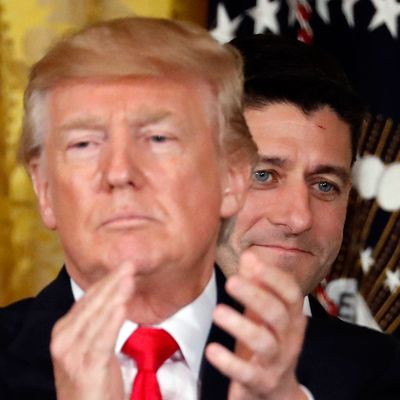
It is almost impossible to overstate how important a role “crony capitalism” played in the right-wing critique of Barack Obama’s policies. It was the heart of Mitt Romney’s charge that Obama was smothering the economy. (“He’s been practicing crony capitalism. And if you want to get America going again you’ve got to stop the spread of crony capitalism.”) “Elites in Washington should NOT be picking winners & losers—that’s a recipe for a closed economy—for cronyism,” said Paul Ryan. Obamacare represented “corporate America’s worst crony-capitalist impulses,” charged Marco Rubio.
The denunciations of crony capitalism served two crucial purposes. It dramatized the Republicans’ belief that the tea-party insurgency had cleansed them of the corruption and failure of the Bush administration, for which they could no longer be held responsible. And it likewise allowed conservatives to deflect the charge that they favored the rich — it was Obama who favored the powerful, through his support for policies like green-energy loans and the auto bailout that saved selected industries. Republicans stood for an impartial government that allowed the invisible hand to work its magic.
That idea, so central to the party’s self-conception, has fallen by the wayside in the Trump era. Obviously Trump himself has never had any use for free-market dogma, having spent his career as a developer seeking government favors for his business, and then seamlessly transitioning into using his public powers for self-enrichment. But Trump’s casual disregard for a once-cherished conservative principle has been widely shared within his party.
West Virginia governor Jim Justice, who just switched his party registration from Democratic (which was tenuous) to Republican, proposes that the federal government spend $4.5 billion a year to support his state’s coal industry. It is not only that Justice believes coal in general needs to be subsidized in relation to the cheaper, cleaner energy sources that are beating it out. He believes Appalachian coal in particular needs support vis-à-vis coal from the West. “The survivability of the Eastern coalfields is very, very iffy,” Justice says. “And if you lose the Eastern coalfields, you are putting the country at risk beyond belief.”
In Wisconsin, Governor Scott Walker is pushing a $3 billion package of state tax incentives, which could be paid out in straight cash, for Foxconn to build a plant in his state. Under the most generous assumptions, a study concludes, it would take the state 25 years to break even. The unemployment rate in Wisconsin is already 3.2 percent, and as Danielle Paquette points out, “Employers there already complain about having trouble finding workers.”
The plant would be located in Paul Ryan’s district, and the House Speaker has played an instrumental role both in wooing Foxconn and pleading with the state legislature to approve the massive cost. “Obviously I tell state lawmakers, let’s get this done,” he says.
Kevin Seifert, an adviser to Ryan explains, “In Wisconsin, you are judged on results — if you are actually improving people’s lives.” Not freedom and capitalism? Results? Improving people’s lives? It is almost impossible to defend the Foxconn deal on that basis anyway, unlike the maligned energy loans in the stimulus or the auto bailout, which produced huge public benefits at little cost. But the mere fact that “improving people’s lives” is the standard shows that the Obama-era posture of strict free-market purity has been relegated to a historical relic. The conservative movement’s hair-on-fire posture against Obama, whose socialist radicalism was allegedly snuffing out the last vestige of economic liberty, rested substantially on the strict application of a principle of convenience.






























